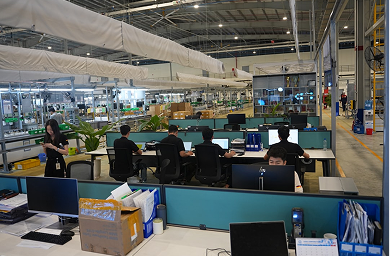The electronic components and semiconductor industries are rapidly growing in Vietnam, with the participation of both domestic and international companies. In addition to the demand for technology and equipment, a high-quality workforce is a crucial factor for the sustainable development of the sector. Exporting domestic labor has become a significant solution to address workforce demands while providing Vietnamese workers with opportunities to advance their careers in this field.
1. The Importance of Domestic Labor Export for the Electronic Components and Semiconductor Industries

Domestic labor export involves supplying skilled workers from various regions within the country to companies in the electronic components and semiconductor sectors. As these industries are booming, the demand for technically proficient labor is rising. Domestic labor export not only addresses workforce needs but also reduces reliance on importing labor from abroad, helping retain talent within the country and optimizing costs for businesses.
Vietnam’s semiconductor industry has attracted attention from technology-driven countries like Taiwan, China, Japan, South Korea, and the United States. Foreign investors are drawn to Vietnam not only for its competitive labor costs but also for its abundant and skilled workforce. This presents a significant opportunity for Vietnam to develop a robust human resource base for the electronic components and semiconductor sectors, especially by promoting domestic labor export.
2. Current State of Workforce Supply in the Semiconductor and Electronic Components Sectors
These industries demand technically skilled workers, particularly in areas such as manufacturing, assembly, quality control, and high-tech machinery operation. Companies are actively sourcing labor from domestic training centers to ensure a ready and suitable workforce.
However, the main challenge is ensuring that the labor force is well-trained and meets industry standards. Many vocational training programs in Vietnam still fall short of industry requirements, necessitating close collaboration between training institutions and businesses to enhance workforce competency.
3. Benefits of Domestic Labor Export for the Industries

3.1 Domestic labor export in Semiconductors brings benefits for Employers and Employees
- For Businesses: Utilizing domestic labor helps reduce recruitment and labor costs while maintaining a locally based workforce. Companies can more easily recruit and train workers on-site without heavily investing in labor import programs, alleviating financial burdens and ensuring better labor quality control.
- For Workers: Domestic workers gain career advancement opportunities in high-tech industries, accessing advanced technology and knowledge. This not only provides employment but also enhances workers’ professional skills, making them more competitive in the international job market.
3.2 Trends and Challenges
The Electronic Components and Semiconductor Industries in Vietnam are poised for robust growth. Yet, companies face significant challenges in sourcing and retaining high-quality labor.
Few challenges include:
- Competition with Imported Labor: Developed countries like South Korea and Japan offer a steady supply of highly skilled workers. To compete, Vietnamese workers must continually improve their skills and expertise.
- Ensuring Quality Training: Vietnam’s education and training system must evolve to meet industry needs. Training programs must be updated and aligned with practical industry demands to equip workers with essential skills.
Solutions to Strengthen Domestic Labor Export for the Semiconductor Sector
- Investment in Education and Training: Focusing on vocational and practical skills training is crucial to meet business needs. Training programs should emphasize technology, quality management, and workplace safety.
- International Collaboration: Partnering with countries with advanced technology to share knowledge and best practices can help Vietnamese workers stay abreast of technological advancements.
- Corporate Involvement in Training: Companies should offer internships and on-site training programs to ensure that workers can perform effectively from day one.
Exporting domestic labor in the electronic components and semiconductor industries is a strategic solution for Vietnam to maximize its human resource potential. This not only reduces reliance on imported labor but also develops a highly skilled domestic workforce ready to meet industry demands.To succeed, Vietnam must continue investing in education and training while enhancing international cooperation to elevate workers' skill levels, thus building a sustainable and competitive semiconductor industry on the global stage.
Join our Zalo group for HOT JOB opportunities: https://zalo.me/g/osiedw964


